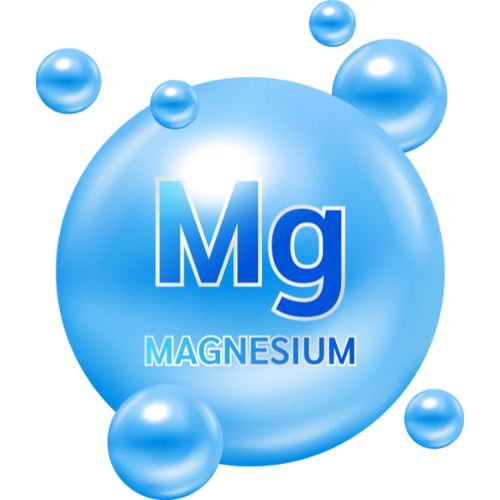Why Magnesium Deficiency is Common in Aging Adults
As we age, the body’s ability to absorb and utilize magnesium declines, making magnesium deficiency a common issue for individuals over 40. Combined with dietary inadequacies, lifestyle factors, and medical conditions, this can exacerbate age-related health concerns such as fatigue, bone density loss, and cardiovascular issues. Incorporating anti-aging supplements like magnesium citrate into your routine can help mitigate these challenges, promoting vitality and long-term wellness.
Dietary Inadequacy:
Modern diets often lack sufficient magnesium due to the consumption of processed foods and reduced intake of magnesium-rich foods like leafy greens, nuts, and whole grains.
Soil Depletion:
Overfarming and soil degradation have reduced the magnesium content in many fruits and vegetables, making it harder to meet daily requirements through diet alone.
Stress and Lifestyle Factors:
Chronic stress increases magnesium excretion through urine, further depleting the body’s reserves. For individuals over 40, managing stress becomes even more critical for maintaining magnesium levels.
Medical Conditions:
Certain health issues, such as gastrointestinal disorders (e.g., Crohn’s disease) or diabetes, impair magnesium absorption and utilization—issues that often become more prevalent with age.
Medication Use:
Common medications like diuretics, antacids, and certain antibiotics can deplete magnesium levels over time. For aging adults, long-term medication use can contribute to magnesium deficiency.
Implications of Magnesium Deficiency for Aging Adults:
-
Fatigue and low energy levels, which are common as metabolism slows with age.
-
Muscle cramps and spasms, often exacerbated by reduced activity levels.
-
Irregular bowel movements and constipation, which can increase with age.
-
Increased stress and difficulty relaxing, linked to magnesium’s role in nervous system regulation.
-
Long-term impacts on bone density and cardiovascular health, critical concerns for those over 40.
How Magnesium Citrate Supports Aging Health:
-
Highly Bioavailable: Offers a highly bioavailable form of magnesium to efficiently replenish body stores.
-
Symptom Relief: Addresses multiple symptoms of deficiency, such as muscle cramps and fatigue, that often impact aging adults.
-
Vitality and Energy: Serves as one of the best natural supplements for energy and vitality, ensuring sustained energy levels throughout the day.
-
Overall Wellness: Supports both immediate concerns (e.g., energy and digestion) and long-term health maintenance (e.g., bone density and heart health).
Magnesium Deficiency Tests for Aging Adults
Japanese Tongue Test:
A simple taste test using magnesium chloride solution.
-
Process: Place a small amount of magnesium chloride solution on your tongue and assess the taste.
-
Results:
-
No taste or very faint taste: Indicates severe magnesium deficiency.
-
Slightly salty taste: Suggests moderate deficiency.
-
Strong, bitter taste: Indicates sufficient magnesium levels.
-
Unbearably bitter taste: Indicates optimum magnesium levels.
-
Rationale: A magnesium deficiency impairs your ability to taste magnesium’s natural bitterness. This simple test can help aging adults assess their magnesium levels quickly and easily.
Rank and Trial Test:
A structured trial to identify magnesium deficiency based on symptom improvement:
-
Create a Table: Include 4 columns to track outcomes.
-
Monitor Symptoms: Symptoms that improve while taking magnesium and worsen when supplementation stops likely indicate a deficiency.
Why These Tests Matter: Both methods offer non-invasive, cost-effective approaches to recognizing magnesium deficiencies. The Rank and Trial test empowers individuals over 40 to systematically monitor their symptoms over time and validate the impact of supplementation.
Limitations:
-
Neither test is a replacement for clinical testing like RBC magnesium levels.
-
Results may vary based on individual symptoms, diet, and overall health.
Personal Preference: I personally prefer the Japanese Tongue Test. The reason? The symptom list is extensive, and many could be attributed to other issues. Plus, if you're anything like me, you might not notice some symptoms—but I'll leave it to personal preferences. – Jase
Potential Symptoms of Magnesium Deficiency in Aging Adults
Neuromuscular Symptoms:
-
Muscle cramps and spasms.
-
Twitching and tremors (e.g., eyelid or facial twitching).
-
Muscle weakness.
-
Restless Leg Syndrome (RLS).
-
Numbness and tingling (e.g., in the extremities).
-
Poor coordination.
-
Chronic muscle fatigue.
Neurological Symptoms:
-
Fatigue and low energy (chronic tiredness).
-
Headaches and migraines.
-
Brain fog (difficulty concentrating or remembering).
-
Insomnia and poor sleep quality.
-
Anxiety.
-
Depression.
-
Irritability and mood swings.
-
Dizziness.
Cardiovascular Symptoms:
-
Heart palpitations (irregular heartbeat).
-
Arrhythmias (abnormal heart rhythms).
-
Chest tightness or pain (linked to muscle spasms in the chest).
-
High blood pressure (hypertension).
-
Poor circulation.
Gastrointestinal Symptoms:
-
Constipation.
-
Bloating and abdominal cramps.
-
Poor digestion.
-
Nausea and vomiting.
-
Loss of appetite.
Metabolic Symptoms:
-
Insulin resistance.
-
Uncontrolled blood sugar levels (can worsen diabetes).
-
Cravings for chocolate or salt (possible indication of deficiency).
Bone and Joint Symptoms:
-
Bone density loss (osteoporosis over time).
-
Joint pain or stiffness.
-
Delayed recovery after injury.
Other Symptoms:
-
Frequent muscle injuries (e.g., strains, sprains).
-
Chronic Fatigue Syndrome (CFS)-like symptoms.
-
Premenstrual Syndrome (PMS) symptoms.
-
Excessive thirst (mild dehydration linked to imbalance).
-
Cracked or weak nails.
-
Hair loss or poor hair health.
-
Cold sensitivity.
Conclusion: Aging Gracefully with Magnesium Citrate
For individuals over 40, maintaining optimal magnesium levels is crucial for energy, cognitive function, and overall wellness. By incorporating anti-aging supplements like magnesium citrate into your routine, you can address common aging concerns such as fatigue, bone health, and muscle recovery. Explore our range of natural supplements for energy and vitality and discover how magnesium can help you live your healthiest, most vibrant life.
Let me know if you'd like further refinements!




Leave a comment
All comments are moderated before being published.
This site is protected by hCaptcha and the hCaptcha Privacy Policy and Terms of Service apply.